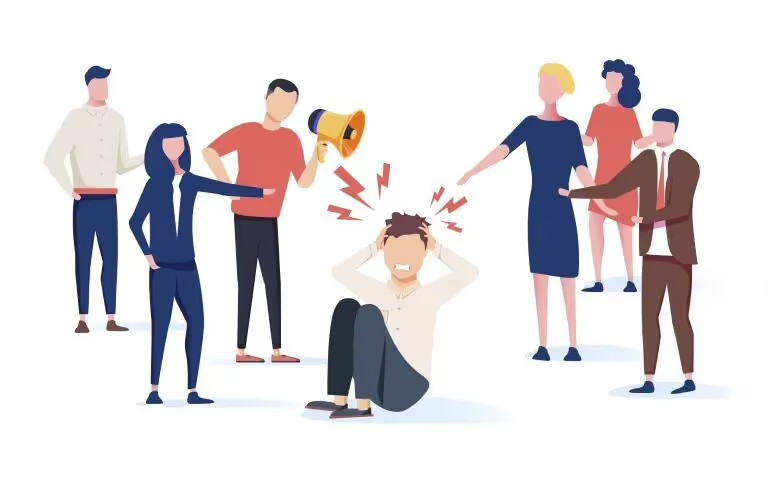The Monday round-robin begins onscreen. Despite being asked to be on video, some team members still have their cameras off. A new staffer begins an update when another jumps in: “Look, I’ve got the latest numbers, I’ll go.” The interrupter takes over as the new staffer grimaces and shuts off her camera.
Rude behavior at work is nothing new. Yet two years into the pandemic, you’re not alone if you think it’s getting worse. Recent studies show workplace rudeness is not only on the rise, but that virtual workspaces — key to the hybrid work models 90% of us have said we desire long-term, according to a Gallup poll — can cause us to feel undermined in the workplace.
By now we know the snafus that come with communicating in such an environment. We’ve experienced spotty internet or the invasion of a pet or child during video meetings, and we respond instantaneously to work texts and emails, even when they arrive outside of office hours. We’ve tried to cope with the absence of non-verbal communication — the instinctive gestures and non-verbal cues that complete everything we say. Those actions simply don’t translate as well onscreen as they do in a conference room.
And while societal incivility hasn’t been formally linked to economic outcomes, it’s notable that record-high job resignations in November 2021 were led by workers in restaurant and healthcare positions — jobs that require daily interactions with customers.
All these shifts in our work and home lives, along with the atrophy of once-prevalent social settings that may have helped us be on our best behavior, have created fertile ground for rudeness, particularly in environments where success has traditionally depended on a degree of self-control. In short, we’ve built some bad habits. Here’s how to get some of that civility back.
Recognize that rudeness spreads like a disease.
In an insightful University of Florida study, participants were asked to watch either a video of two co-workers having a polite interaction or co-workers having a rude conversation. After, the viewers were given a customer email to respond to that had nothing to do with the videos, but that was written in either a moderate tone or extremely rude one. Those who viewed the rude video were more likely to create a hostile email response, while those who watched the polite video stayed neutral, no matter which email they were asked to respond to.
This study shows how the mere act of observing uncivil behavior leads us to pass it on. We don’t even have to be victims of rudeness to do so. This makes sense since we know that negative results influence our thoughts and actions more than positive ones. But it has a particularly bad effect in the workplace because studies show rudeness decreases productivity.
To tamp down rudeness, you can offer workers more choice in their jobs to make them “less likely to reciprocate incivility,” according to Portland State researchers. This will help them devote more time and energy to reflect on uncivil situations, discuss tensions with colleagues, and step away from work to be able to regain perspective.
Understand how bias drives belligerence.
As we often say, every brain has bias — a set of mental shortcuts that shape the way we make decisions. Understanding bias can help you get to the heart of many problems, including uncivil behavior. Three of the most common biases include experience bias, or our tendency to rely too heavily on our previous experiences; distance bias, which is our preference for what’s closer over what’s farther away; and similarity bias, or our preference for people who are like us rather than those who are different.
All of these play a role in rudeness, from how we treat new team members working remotely to how we may react to someone who interrupts us. Identifying and mitigating the sources of bias can help you decrease incivility. One way to do this is to “switch places” when you experience rude behavior and try to put yourself in the rude person’s shoes.
To be sure, this isn’t easy because rudeness can trigger our biases, causing us to freeze. But if you can ask yourself, “Why did that person do that?” you may discover that a colleague is acting unintentionally or reflecting frustration due to their own circumstances. Seeking perspective can have a calming and focusing effect that rumination won’t, allowing you to dismantle bias in real time.
Learn how to manage cognitive stress.
Our brains are built to process information under a variety of conditions. When we tackle the unknown — something we’re doing more often than ever in this pandemic — we depend heavily on our working memory to get it done. That’s the part of our brain that grabs the ball on new tasks quickly, with one big drawback: it doesn’t allow us to remember the information very long. So if we’re overloaded with new things to learn, that can make us forgetful at best and short-tempered at worst.
Simplifying time and processes to create efficiencies can help, along with short, self-directed breaks that can help you and your team recharge and recover from rude, negative behavior.
Build compassion-driven support models.
The current incivility we’re experiencing gives us a unique opportunity to better connect with each other, and grow our organizations as a whole. We’ve found that compassion — even more than empathy and sympathy— can be a powerful engine to drive real change. Organizations that build compassionate response systems are more adaptive and resilient.
When you remember that organizational culture is shared, incivility, like most bad habits, can be changed with an approach that prioritizes making your organization more polite and civil – two traits we could all use a bit more of these days.






.avif)

